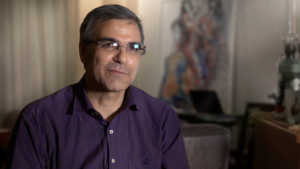Directed by Sahra Mani, Bread and Roses is a documentary that captures the experiences of Afghanistan’s women under the Taliban since they took control of Kabul. Released in 2023, the film features footage from Sharifa, an ex-government employee forced indoors, Zahra, a woman organizing activists in her dentistry practice, and Taranom, who seeks refuge in Pakistan. At our exclusive screening, Sahra joined us for a Q&A session with Naba Sheikh, a student filmmaker at James Madison High School whose film, Guns Down, Arms Up, won the 2023 Speak Truth to Power Video Contest.
This interview has been edited for length and clarity.
Naba Sheikh: You have a personal connection to the subject matter of the film, since the story of Afghan women is your story as well. How did that personal connection translate through film?
Sahra Mani: The story for Afghan women is my story because I am a woman filmmaker from Afghanistan. I lived there, I saw the story of my mother, my grandmother, and other women around me. The same story is repeated. When we don’t learn from past mistakes, we repeat them. The story of Afghanistan gets repeated because we haven’t learned from past mistakes.
When women of Afghanistan try to get an education and participate in public life, the Taliban imprisons them. By saying that education is a privilege for girls and women in Afghanistan, not a right, our society misses out on their potential.
Naba: How does gender apartheid in Afghanistan relate to gender inequality and injustice in other countries?
Sahra: The Taliban has imposed their ideology on an entire nation. They’ve banned art, culture, cinema, education—and today, Afghan women are paying the price. But tomorrow, the rest of the world might have to pay too, because the Taliban is growing, and they won’t stay in Afghanistan forever. With so many other conflicts happening across the globe, the world has stopped paying as much attention to Afghanistan. This has normalized what the Taliban is doing, which really shouldn’t be considered normal. The Taliban are international terrorists, and we’ve handed a part of the world to them.
Naba: You titled the film, “Bread and Roses.” Bread is a means of sustenance, but roses also connect to beauty and femininity. What was your thought process behind the title and how it translated throughout the film?
Sahra: I think roses also refer to dignity and equality in society. Bread comes from what Afghan women were chanting in the Kabul streets—they went out and asked for a job, education, and freedom. I came up with “Bread and Roses” because I wanted the title of the film to connect with what Afghan women are asking for.
Later on, I learned that this name has a long story in the history of women’s movements all over the world. There is a poem and several films by this name, and I am glad my film is part of this—I think it is all linked.
Naba: Throughout the film, we saw three different anecdotal stories of the women showing their varying experiences and how they navigated the collapse of Kabul. How do you as a filmmaker merge these stories together and bring it back to the larger issue?
Sahra: It was important for me to tell the story of these young women who had some ability and talent to offer to society, who were then imprisoned inside their homes. I wanted to show how much we lost. And, to show their strength and resilience and hope—especially hope.
Although I’m not the protagonist, as a local woman filmmaker, I am also personally affected by these issues. Because of my work, I’m not able to go back to my country, I cannot make films in my country. I wanted to share other stories of women like me. Being a local filmmaker also helped me build trust with the other women featured in the film. I think local filmmakers often bring a unique, personal perspective, and play a valuable role in introducing their society and culture to an international audience.
Naba: Ending with the message of hope that you talked about, what is your message of hope to viewers, other filmmakers, and advocates?
Sahra: The hope is the women themselves. When there are strong women in society, there is strong hope. We shouldn’t forget that women everywhere, even living under a dictatorship, still play a strong role in the family, in the community, in society. It is important to support women and keep them strong.



